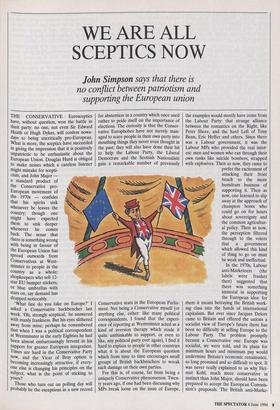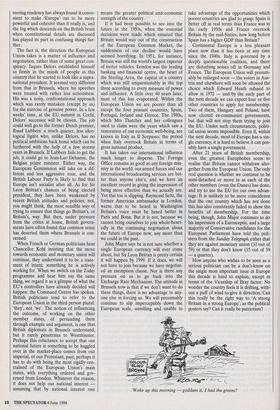WE ARE ALL SCEPTICS NOW
John Simpson says that there is
no conflict between patriotism and supporting the European union
`What line do you take on Europe?' I asked a Conservative backbencher last week. 'Oh, strongly sceptical,' he answered with manly frankness. But his eyes slithered away from mine; perhaps he remembered that when I was a political correspondent at Westminster in the early Eighties he had been almost embarrassingly fervent in his support for greater European integration. Times are hard in the Conservative Party now, and the Vicar of Bray option is becoming increasingly attractive; if every- one else is changing his principles on the subject, what is the point of sticking to Yours?
Those who turn out on polling day will Probably be the exceptions in a new record for abstention in a country which once used rather to pride itself on the importance of elections. The curiosity is that the Conser- vative Europhobes have not merely man- aged to scare people in their own party into mouthing things they never even thought in the past; they will also have done their bit to help the Labour Party, the Liberal Democrats and the Scottish Nationalists gain a remarkable number of previously Conservative seats in the European Parlia- ment. Not being a Conservative myself (or anything else, either: like many political correspondents, I found that the experi- ence of reporting at Westminster acted as a kind of aversion therapy which made it quite unthinkable to support, or even to like, any political party ever again), I find it hard to explain to people in other countries what it is about the European question which from time to time encourages small groups of British backbenchers to wreak such damage on their own parties.
For this is, of course, far from being a uniquely Conservative phenomenon. Twen- ty years ago, if one had been discussing why MPs break loose on the issue of Europe, In the 1970s, Labour anti-Marketeers (the labels were franker then) suggested that there was something immoral in supporting the European idea: for them it meant betraying the British work- ing class into the hands of international capitalism. But ever since Jacques Delors came to Britain and offered the unions a socialist view of Europe's future there has been no difficulty in selling Europe to the Labour Party. The problem promptly became a Conservative one: Europe was socialist, we were told, and its plans for minimum hours and minimum pay would undermine Britain's economic renaissance, so long promised and so difficult to spot. It was never really explained to us why Hel- mut Kohl, much more conservative in instinct than John Major, should have been prepared to accept the European Commis- sion's proposals. The British anti-Marke- teering tendency has always found it conve- nient to make 'Europe' out to be more powerful and cohesive than it really is, and the fog which descends on the British brain when constitutional details are discussed has played its part in confusing things fur- ther.
The fact is, the direction the European Union takes is a matter of influence and negotiation, rather than of some great con- spiracy. Jaques Delors established himself so firmly in the minds of people in this country that he started to look like a supra- national president. It seemed very different from that in Brussels, where his speeches were treated with rather less seriousness. His was a noisy, confrontational approach which was rarely mistaken (except by us) for the exercise of genuine power. In a few weeks' time, at the EU summit in Corfu, Delors' successor will be chosen. The job could well go to the former Dutch premier, Ruud Lubbers: a much quieter, less ideo- logical figure who, unlike Delors, has no political ambitions back home which can be furthered with the help of a few stormy years in Brussels. If Lubbers fails to get the job, it could go to Jean-Luc Dehaene, the Belgian prime minister. Either way, the European Commission will take on a dif- ferent and less aggressive tone, and the British Labour Party is likely to find that Europe isn't socialist after all. As for Sir Leon Brittan's chances of being elected president, they have been weakened by recent British attitudes and policies; not, you might think, the most sensible way of trying to ensure that things go Brittan's, or Britain's, way. But then, under pressure from the critics at home, British govern- ments have often found that common sense has deserted them where Brussels is con- cerned.
When French or German politicians hear Chancellor Kohl insisting that the move towards economic and monetary union will continue, they understand it to be a state- ment of intent: something he is actively working for. When we switch on the Today programme and hear him say the same thing, we regard it as a glimpse of what the EU's controllers have already decided will happen: the Command Centre has spoken. British politicians tend to refer to the European Union in the third person plural: `they', not 'we'. The notion of influencing the outcome, of working on the other member states, of persuading them through example and argument, is one that British diplomats in Brussels understand, but it rarely penetrates to Westminster. Perhaps this reluctance to accept that our national future is something to be haggled over in the market-place comes from our imperial, or our Protestant, past; perhaps it has to do with being the most rigidly cen- tralised of the European Union's main states, with everything ordered and gov- erned from London. Whatever the reason, it does not help our national interest assuming that by national interest one means the greater political and economic strength of the country.
If it had been possible to see into the future in the 1950s, when the essential decisions were made which ensured that Britain would stay out of the construction of the European Common Market, the suddenness of our decline would have seemed horrifying. In 1951, for instance, Britain was still the world's largest exporter of motor vehicles. London was the leading banking and financial centre, the heart of the Sterling Area, the capital of a country which was still unquestionably in the top three according to every measure of power and influence. A little over 40 years later, most of this has evaporated. Within the European Union we are poorer than all except the four peasant countries, Spain, Portugal, Ireland and Greece. The 1980s, which Mrs Thatcher and her colleagues used to claim were the years which saw a restoration of our economic well-being, are known in Italy as II Sorpasso: the period when Italy overtook Britain in terms of gross national product.
It has taken our international influence much longer to disperse. The Foreign Office remains as good as any foreign min- istry in the world, our armed forces and our international broadcasting services are bet- ter than anyone else's, and we have an excellent record in giving the impression of being more effective than eve actually are. Yet this too is slipping. Raymond Seitz, the former American ambassador in London, warns that to be heard in Washington Britain's voice must be heard better in Paris and Bonn. But it is not, because we cannot bring ourselves to join whole-heart- edly in the continuing negotiation about the future of Europe now, any more than we could in the past.
John Major says he is not sure whether a single European currency will ever come about, but Sir Leon Brittan is pretty certain it will happen by 1999. If it does, we will not have to join because we have negotiat- ed an exemption clause. Nor is there any pressure on us to go back into the Exchange Rate Mechanism. The attitude in Brussels now is that if we don't want to do these things, there is no advantage to any- one else in forcing us. We will presumably continue to slip imperceptibly down the European scale, unwilling and unable to take advantage of the opportunities which poorer countries are glad to grasp. Spain is better off in real terms than France was in the early 1950s and France overtook Britain by the mid-Sixties; how long before Spain has a higher GDP than Britain?
Continental Europe is a less pleasant place now than it has been at any time since the 1940s. Italy is governed by a deeply questionable coalition, and there are disturbing noises off in Germany and France. The European Union will presum- ably be enlarged soon — the voters in Aus- tria and elsewhere will soon be allowed the choice which Edward Heath refused to allow in 1972 — and by the early part of the next decade we can expect four or five other countries to apply for membership. Two of them, Hungary and Poland, have now elected ex-communist governments, but that will not stop them trying to join the EU. Under such circumstances, politi- cal union seems impossible. Even if, within the next decade, most of Europe has a sin- gle currency, it is hard to believe it can pos- sibly have a single government.
After 21 years of British membership, even the greatest Europhobes seem to realise that Britain cannot withdraw alto- gether from the European Union. The only real question is whether we continue to be semi-detached or move in as each of the other members (even the Danes) has done, and try to use the EU for our own advan- tage. It is unlikely to be mere coincidence that the one country which has not done this has also consistently failed to show the benefits of membership. For the time being, though, John Major continues to do his impression of a Eurosceptic, and a large majority of Conservative candidates for the European Parliament have told the poll- sters from the Sunday Telegraph either that they are against monetary union (31 out of 59) or that they don't know (15 out of 59 — a quarter).
How anyone who wishes to be seen as a serious politician can be a don't-know on the single most important issue in Europe this decade is hard to explain, except in terms of the Vicarship of Bray factor. No wonder the country feels it is drifting, with- out a puff of wind to give it direction. Can this really be the right way to 'A strong Britain in a strong Europe', as the political posters say? Can it really be patriotism?
'Woke up this morning — goddam it, I had the greens!'



























































 Previous page
Previous page